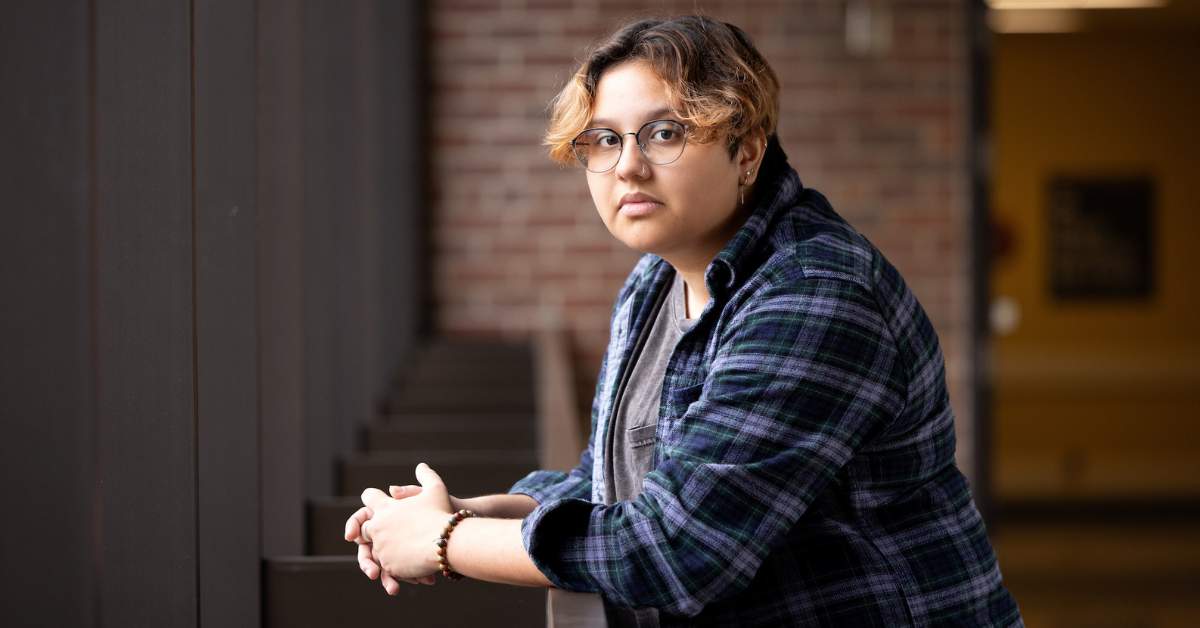Commit
Using “commit” emphasizes a pledge to prioritize antiracist efforts in making SPH a more welcome, equitable, and just organization.
What do you see as your role in antiracism?
 “As a person whose identity has been marginalized in a lot of different ways, I think that coming to school and choosing to participate as my full self is an act of antiracism. It is difficult for Native people to obtain an advanced degree because of the lack of accessibility to higher education for our people. As a two-spirit person, I am making the most of my experience, including participating in the SPH Student Senate (SPHSS) and being vocal about the changes I want to see at our school and in the field of public health.”
“As a person whose identity has been marginalized in a lot of different ways, I think that coming to school and choosing to participate as my full self is an act of antiracism. It is difficult for Native people to obtain an advanced degree because of the lack of accessibility to higher education for our people. As a two-spirit person, I am making the most of my experience, including participating in the SPH Student Senate (SPHSS) and being vocal about the changes I want to see at our school and in the field of public health.”
How do you plan to stay engaged in the SPH plan for antiracism?
“Addressing racism is one of the main reasons why I decided to study public health; a public health approach is needed to address something that is entrenched in our systems as racism. So SPH’s Strategic Plan for Antiracism (SPAR) was definitely a contributing factor to my choice of pursuing an MPH here. As the president of SPHSS, I acknowledge that part of my responsibility is to engage with antiracist efforts at SPH, and ensure that the perspectives of our students are being taken seriously.”
Challenge
We are “challenged” to accept that racism exists and to “challenge” it when we see it.
How are you challenging those around you?
“I am a fighter, and I have fought my whole life. I will speak up if I think something is harmful, whether it is something inappropriate someone said or something dangerous I am noticing in the larger system. I am also finding ways to challenge myself, including approaching my peers and community members with cultural humility. I know that I have the capacity to challenge myself and those around me, and not everyone has that capacity, and that is okay. But for me, I am trying to constantly practice holding others, and myself, accountable.”
What antiracist change have you been excited to see happen at SPH the past few years, if any? What could we be doing better?
“Honestly, I haven’t felt that much change. I think that student perspectives get lost. We hear about SPAR and how racism is a public health issue, but we don’t get to really discuss that in class or have open dialogue about it. The only course I felt comfortable doing that in was Medical Sociology taught by Donna McAlpine, and it was super engaging. We need more opportunities like that to learn, grow, discuss, and challenge each other. Even though I haven’t felt that much change in the year that I have been at SPH, I want to stick around and be a part of it, and I am hoping to see more in the future.”
Change
We have to be willing to “change” and shift our beliefs, attitudes, and actions toward equity and justice.
What is your vision for an antiracist school of public health?
 “My vision would include more frequent and transparent dialogue between faculty, staff, and students. I feel like institutions of higher education like SPH can put a big emphasis on institutional hierarchy. That can make it challenging to push forward change if faculty or people in leadership are unwilling to have difficult conversations. Change is uncomfortable, but we can choose to embrace that discomfort and continue moving forward with antiracism rather than staying still. I also think that there needs to be people of color at every level, from academic ranks to student leadership, and that there are measures in place to ensure that diverse perspectives are being valued. Finally, an antiracist school would do whatever it could to ensure that students feel well-supported – whether that is financially, emotionally, or otherwise.”
“My vision would include more frequent and transparent dialogue between faculty, staff, and students. I feel like institutions of higher education like SPH can put a big emphasis on institutional hierarchy. That can make it challenging to push forward change if faculty or people in leadership are unwilling to have difficult conversations. Change is uncomfortable, but we can choose to embrace that discomfort and continue moving forward with antiracism rather than staying still. I also think that there needs to be people of color at every level, from academic ranks to student leadership, and that there are measures in place to ensure that diverse perspectives are being valued. Finally, an antiracist school would do whatever it could to ensure that students feel well-supported – whether that is financially, emotionally, or otherwise.”
What is the most important ingredient for culture change in our school and as a community?
“Something that Professor Katy Kozhimannil said in class was, ‘You have to find a problem you really care about this semester – one that makes you big mad – and pursue it.’ I like that idea because I think everyone has something that pushes them to take action, but we often think of them as separate issues. Public health shows us that a lot of the issues we care about are intertwined, and working together to address issues that we care about collectively can make a huge impact.”
“Building Equity, Driving Justice: Commit | Challenge | Change” — ties all communications related to the SPH Strategic Plan for Antiracism together under one look and feel. The theme showcases our guiding principles, and it motivates and inspires. "Agents for Change" profiles support this theme and all interview questions are related to the action words, Commit, Challenge, Change, as described above.
Submit an idea for this profile series — either your own story, or one that inspires you from another SPH individual or group.

